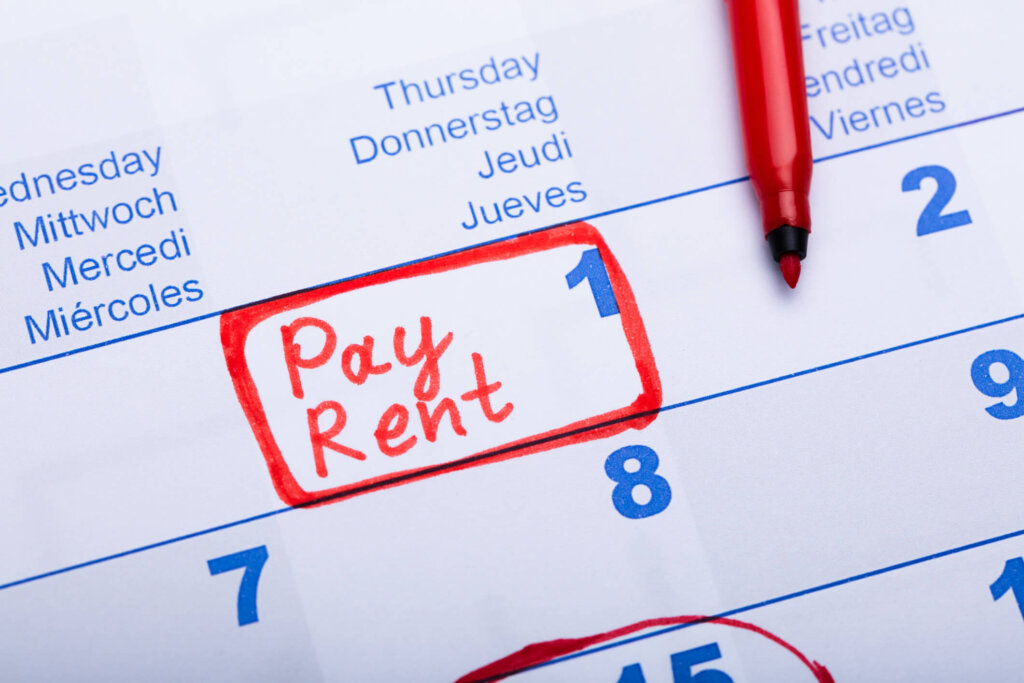It’s a common practice for landlords to collect a security deposit and first month’s rent when their new tenants move into their rentals. Doing this not only protects you and your investment but also sets the tone for the tenants moving in. After all, you are running a business and being able to pay for the rental you are providing is your tenant’s responsibility.

That said, many landlords wonder if it’s best to collect last month’s rent at move-in time as well.
If you’re on the fence about whether to ask your tenants in Houston for a security deposit, first month’s rent, and last month’s rent, keep reading. We have the pros and cons laid out for you to see, so you can make a stress-free decision.
What is Last Month’s Rent?
Last month’s rent is a sum of money you collect from your tenants before move-in that is equal to one month of rent. You collect it intending to cover your tenant’s last month of rent dues at the end of the lease. This collection of money is noted in the signed lease agreement and is agreed upon by both parties.
If your tenants pay you last month’s rent at the time of move-in, no rent will be due at the end of their lease term. If you offer your tenants a lease renewal, this money will usually carry over into the new term.
Keep in mind that last month’s rent is very different from these deposits:
- First Month’s Rent: this is equal to one month of rent and is collected before your tenants move in. This money covers the first month of rent. It also offsets the costs associated with tenants that break the lease agreement early on.
- Security Deposit: this sum of money usually ranges from one to three months’ worth of rent payments. It protects you in the case of property damage beyond normal wear and tear or a breach of the lease agreement. Should your tenants damage your rental property or fail to pay rent, this money can be used to offset those costs.
Pros of Collecting Last Month’s Rent Before Move-In
There are plenty of good reasons to collect last month’s rent from your tenants before move-in day.
1. Extra Cash in Hand
One of the biggest problems landlords see at the end of lease terms is their tenants thinking they can use their security deposit to cover the last month’s rent. Of course, this is not allowed. In fact, if a tenant tries to use their security deposit as payment for the last month of rent, they could end up owing the landlord three times the actual rent amount.
That said, tenants will do as they wish sometimes, leaving you out of luck until you pursue them in court, which takes time and money.
By collecting last month’s rent upfront in addition to a security deposit, you give yourself a cushion come the end of the lease term. This is especially helpful for landlords that legally can only collect one month’s worth of rent.
2. Added Financial Protection
Landlords don’t place tenants in their Houston properties with the hopes they’ll leave before the lease term is up. Yet, it happens and there’s nothing you can do to stop it if it does.
One thing you can do, however, is collect a security deposit, first, and last month’s rent to put yourself ahead – just in case. For example, if your tenants move in and then suddenly stop paying rent, you’re now a month ahead. This helps with the inevitable money loss you will experience from having to evict trouble tenants and place new ones in your property.
3. Vetting of High-Quality Tenants
Though you or your property manager will have strict tenant screening processes in place, one thing’s for sure – your Houston property is valuable. The last thing you want to do is place a tenant in your property that cannot afford to pay rent each month.
In addition to background and credit checks, income verifications, and references checks, you can collect last month’s rent from your tenants at move-in to set yourself at ease. After all, if they can front a security deposit and first and last month’s rent, they’ve got money on hand. This means it’s not likely they’ll be late on rent or worse yet, fail to pay their rent when it’s due.
Not to mention, asking for that much money upfront will weed out those that can’t afford your rental. Instead, it will attract the high-quality tenants you want leasing from you.
Cons of Collecting Last Month’s Rent at Move-In
As with all good things, there are some downsides to collecting last month’s rent from your tenants before they move into your rental property in Houston.
1. Rent Increases Become Challenging
One problem with collecting last month’s rent from tenants before move-in is that increasing your rent (should you want to offer existing tenants a lease renewal) then becomes a challenge. Remember, the money collected as last month’s rent typically carries over into a new lease term.
If you raise the rent, you’re going to have to collect the difference from your tenant’s last month’s rent payment at the start of the new lease term. That is unless you want to take a loss. Tenants might agree to a rent increase because it’s the nature of renting. However, if you start collecting additional money, you might find yourself with a vacancy instead.
2. Use of Last Month’s Rent is Limited
In most states, if you collect last month’s rent from your tenants, that’s the only thing you can use that money on.
In other words, you cannot use last month’s rent on:
- Damage to your investment property
- Rent owed to you besides the last month
- Late rent or other fees
- Pet-related damages
- Missing utility payments
Landlords that try to apply last month’s rent to anything other than last month’s rent will find themselves in a lot of trouble for violating the lease agreement and the law. To avoid this, it’s best to collect a security deposit instead of (or at least in addition to) last month’s rent to protect yourself and your property.
3. You Could Owe Interest to Your Tenant
Though there are no interest requirements for landlords who own rental properties in Texas, keep in mind that federal, state, and local laws are always changing. This means that at some point you could end up owing interest on the money you collected from a tenant at move-in that served as last month’s rent.
4. Tenant Pool Shrinkage
Requiring your tenants to pay a security deposit, first, and last month’s rent is a great idea when it comes to protecting yourself financially. However, this can be a major turn-off for even the best of tenants. This is even true for those who can easily afford your required deposits.
Just because a tenant can pay what you’re asking doesn’t mean they’re going to. If you own a rental property in a competitive location, you could find yourself with a smaller tenant pool than you’d like if you ask for that much money upfront.
On the other hand, some tenants may struggle with coming up with that kind of money at the start of a new lease term. After all, moving is not always a cheap endeavor. Having to front a security deposit and two months’ worth of rent – on top of having to cover moving expenses – may be difficult for some. In the end, you risk losing out on an otherwise perfect tenant and having an extended vacancy in Houston because you ask for one deposit too many.
The Verdict: Should You Collect Last Month’s Rent at Move-In?
In the end, the decision is up to you and your local property management company whether you collect last month’s rent or not. If you feel that it’s too much to ask of tenants at move-in, consider increasing the security deposit slightly to cover future costs.
In all, use an experienced property manager in Houston that’s knowledgeable about landlord-tenant laws to draft an airtight lease agreement that protects you and your asset. After all, that’s the reason you collect last month’s rent anyways. If your property manager can protect you and prevent asking tenants for too much money upfront, you’ll find yourself with a leased rental sooner than later.
Final Thoughts
Ready to have your rental property managed by an experienced property management company in Houston? Then contact us today and see how we can help with everything – starting with last month’s rent and security deposit collections.
At Residential Leasing and Management Corp., we know how important your investment property is. More than that, we understand that generating a profit is one of your priorities, along with tenant satisfaction.
With over 40 years of experience in property management, we’re able to balance your financial success with the happiness of your tenants, so that you enjoy limited vacancies, unmatched customer service, and the peace of mind that your property is being well-cared for while you enjoy the passive income it generates.





